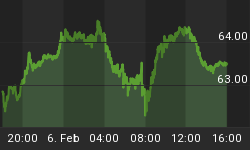In one of those "what could possibly go wrong with that plan" moments - which are becoming all too frequent these days - the New York Times this weekend reported that there is "growing concern inside and outside the Fed that inflation is not rising fast enough."
At some level, this is not exactly new thinking. For decades, economists have argued that "price stability" really means inflation of something just slightly over 0%, because it is assumed to be quite hard to get out of a deflationary spiral. in my view, that's silly, because simply adding a zero to the currency in everyone's pocket is a guaranteed way to get out of deflation. It may be that since nudging inflation higher is harder than kicking it higher, the costs of mild deflation are higher than the costs of mild inflation, but I think the jury is out on that question since it isn't something we have ever experienced. But in any event, this is the reason that inflation in the neighborhood of 2%, rather than 0%, has been the Fed's implicit or explicit target for a long time.
To the extent that discussion stays academic, it's not worrisome. Navel-gazing is an occupational hazard of being a professional economist, after all. But now, there are louder and more frequent voices arguing that 2% is too low a target. To see how urgent a problem this is, I submit the following chart, which shows median CPI, along with a horizontal line at 2.25% (roughly equivalent to a 2% target on PCE). Wow, I can see the reason for panic. We are nearly 0.2% below that! And we got within 0.6% of deflation in 2010, in the aftermath of the worst credit crisis in almost 100 years.

I am all for the idea that mild inflation serves to lubricate the gears of commerce, but we should remember that when the CFO of Costco says he likes rising inflation because in that circumstance "the retailer is generally able to expand its profit margins," that's good for the equity market perhaps but not as good for the consumer!
It always amazes me how sketchy is the understanding of inflation in a capital markets context by members of the Fed. In the aforementioned article, Chicago Fed President Evans is quoted saying "If inflation is lower than expected, then debt financing is more burdensome than borrowers expected. Problems of debt overhang become that much worse for the economy." This is absolutely true, but almost completely irrelevant in the current context. Inflation has been lower than a priori expectations since about 1980, which is why a long-nominal-bond position has routinely outperformed inflation. But currently, as the chart below illustrates, 10-year inflation breakevens are at 2.19%. Fully 72% of all 10-year periods since 1914 have seen compounded inflation above that level.

Ten-year inflation swaps, a better measure of inflation expectations, are at 2.52%, which still doesn't sound like a horrible bet for borrowers. If inflation comes in above 2.52%, the borrower of 10-year fixed-rate money wins; if it comes in below 2.52%, the borrower loses. This is one reason that it is so rare to see corporations issue inflation-indexed debt...they like that bet.
Finally, the article explains that higher inflation allows workers to get higher wages, and gives the example of teachers in Anchorage, Alaska, who just agreed to a contract giving them 1% pay increases for each of the next three years. Since inflation is likely to be above that, the article says, they will be probably receiving a pay cut in real terms. This is absolutely true. (It is also the exact opposite position of the debtor, in that the teachers will do better in real terms if deflation actually happened. Sometimes I just wish the authors of these articles would be consistent.) But this circumstance certainly isn't helped by inflation; since wage increases tend to trail inflation, real wages tend to lag in inflationary upticks.
None of this represents deep insight from this author. It merely represents that I have at least a rudimentary understanding of how inflation works, and a respect for the damage which inflation can cause to economies, workers, and savers. The fact that this is increasingly rare these days is probably cyclical, and unfortunately is probably a minimum condition for setting up this next inflation debacle. In that context, and with more Federal Reserve economists openly musing about needing to target higher inflation, does 2.19% breakeven sound like a bad deal?
You can follow me @inflation_guy!
Enduring Investments is a registered investment adviser that specializes in solving inflation-related problems. Fill out the contact form at http://www.EnduringInvestments.com/contact and we will send you our latest Quarterly Inflation Outlook. And if you make sure to put your physical mailing address in the "comment" section of the contact form, we will also send you a copy of Michael Ashton's book "Maestro, My Ass!"















